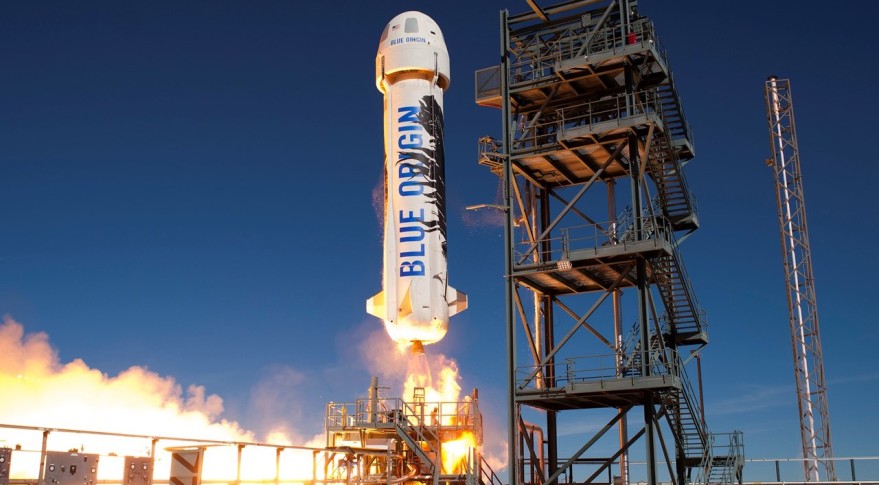Jeff Bezos' Blue Origin Plans Crewed Launch Within a Year

CAMBRIDGE, Mass. — The spaceflight company Blue Origin, which was founded by Amazon.com CEO Jeff Bezos, plans to launch its first crewed flight to suborbital space soon.
"We're trying to get to our first human flights within the next year. That's a laser focus for the team right now," Erika Wagner, Blue Origin's business development manager, told the audience at the New Space Age Conference on Saturday (March 11) here at the Massachusetts Institute of Technology's Sloan School of Management.
In November 2015, Blue Origin made history when it landed its New Shepard rocket after an uncrewed test flight to suborbital space. This was the first time that any company or country had successfully completed a vertical takeoff and landing with a reusable rocket during a mission to space. [How Blue Origin's Suborbital Rocket Ride Works (Infographic)]
"We're pretty proud of that milestone," Wagner said.
Over the next year, Blue Origin launched and landed that same rocket four more times, further demonstrating the reusable-rocket technology that Bezos has said could revolutionize spaceflight by slashing costs.
Elon Musk, SpaceX's billionaire founder and CEO, has expressed similar enthusiasm for reusability. SpaceX has landed the first stage of eight different Falcon 9 rockets during orbital flights and said it plans to re-fly one of these boosters for the first time later this month.
Both SpaceX and Blue Origin are also developing heavy-lift rockets, and each company has said it aims to launch moon missions in the next few years.
Get the Space.com Newsletter
Breaking space news, the latest updates on rocket launches, skywatching events and more!
But if Blue Origin is feeling the pressure, it's not showing it. The company's motto, Wagner pointed out, is gradatim ferociter — Latin for "step by step, ferociously."
The company's first launcher consisted of four Rolls Royce jet engines strapped to a launch frame, and the main purpose of creating it was to develop software, Wagner said. Blue Origin then built small rocket engines, and then bigger ones. Now, the company has the suborbital New Shepherd, and engineers are working on the heavy-lifter New Glenn, an orbital vehicle that's scheduled to fly for the first time by 2020.
This same incrementalist philosophy will also apply to crewed flights, which will begin aboard New Shepard. (Blue Origin also intends to launch people to orbital space eventually, Bezos has said.)
"We're really taking that to the next level and proving out a rocket before we ever put our first human on board," Wagner said.
Safety is the primary goal, she added.
"We don't believe in qualifying a [specified] number of flights," Wagner told the audience. "We believe in qualifying performance. We really believe that safety comes from how well you understand a system."
Wagner said Blue Origin looks to NASA's human spaceflight integration standards — which establish health requirements for the preflight, in-flight, and post-flight phases of such a journey — as a guide.
"As soon as we're ready, we'll have humans on board," she said. "We're not there yet."
You can follow Tracy Staedter at her website and @tracy_staedter. Follow us @Spacedotcom, Facebook and Google+.Originally published on Space.com.
Join our Space Forums to keep talking space on the latest missions, night sky and more! And if you have a news tip, correction or comment, let us know at: community@space.com.
